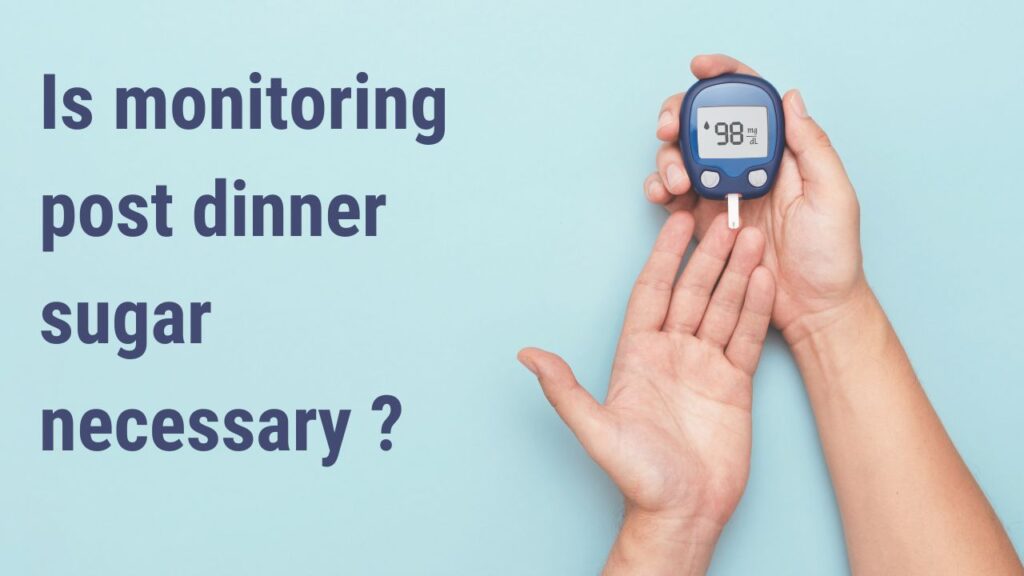A diabetic diet is one that is recommended for individuals with diabetes to manage their blood sugars. Regular monitoring of blood sugar is necessary for your doctor to decide the medical treatment as well as for your dietitian to make dietary modifications. But what people usually check is only fasting blood sugar and post lunch blood sugar and do not consider the post dinner blood sugar. This blog will explore whether you need to also check the post dinner blood sugar, if yes then why?
When should you usually check blood sugar if you are on a diabetic diet?
If you are on diabetes medications and a diabetic diet, it is important to check fasting blood sugar. This is the time when the blood sugar is supposed to be lowest in the body (< 100 mg/dl). It then starts increasing once you eat breakfast. Next it is important to check 2 hours post lunch blood sugar as this is the time when the blood sugar should start dropping down after the rise seen immediately after the lunch. This happens when a hormone called insulin is secreted by the body and it picks up the blood sugar released after eating meals and carries it from the bloodstream into cells. If this insulin does not function well then sugar remains in the bloodstream and is then caught when you do the blood sugar test.
Now this happens after every meal, so if you are eating 2 large meals in a day, it is important to also check the blood sugar after both large meals especially if you are on insulin. It is only for convenience purposes, that only post lunch blood sugar is checked usually and not post dinner blood sugar.
Why Are The Factors That Can Affect Post-Dinner Blood Sugar?
Post-dinner blood sugar can be affected by the following:
• Quantity and type of carbohydrates: Evening meals often include more carbs, which can cause sugar spikes. If you eat more carbohydrates especially refined carbs (which are high in glycemic index) then blood sugar may rise drastically. To know more about glycemix index of foods, click here
• Amount of proteins: If you eat too little or no proteins in dinner and only carbohydrates (like sandwiches/ fried rice/ noodles/ momos/ burgers/ pasta/ pizzas, etc) that too can elevate your post dinner blood sugar
- Sedentary lifestyle: If you have been sedentary for the entire day that too can lead to post dinner rise in the blood sugar levels
What Should Be the Ideal Post-Dinner Blood Sugar Levels?
According to the American Diabetes Association (ADA), for most adults with diabetes, blood sugar levels should ideally be:
• Under 180 mg/dL around 2 hours after meals.
What Are the Benefits of Monitoring Post-Dinner Blood Sugar ?
1. Prevent Nighttime Blood Sugar Spikes: High post-dinner blood sugar levels can lead to high morning readings, impacting overall glucose management, so it is vital to monitor post dinner blood sugar if you are on a diabetic diet
2. Improved Meal Planning: By tracking post-dinner blood sugar, you can make better food choices for your evening meal. For instance, if your levels spike after eating wheat pasta, you may opt for a lentil pasta or multi pulses pasta (to avail our healthy, tasty and protein rich recipes for individuals on a diabetic diet, click here)
3. Better Sleep: High blood sugar levels can disrupt sleep by causing dehydration and increased bathroom trips. By keeping post-dinner levels steady, you’re more likely to get restful sleep
4. Reduced Risk of Complications: Long-term high blood sugar can lead to complications such as heart disease, neuropathy, and kidney damage. Monitoring helps you keep levels in check, reducing these risks
5. Effective Medication Management: Monitoring allows you and your healthcare provider to adjust medications based on real-time data, helping maintain optimal control over your diabetes.
Tips to Manage Post-Dinner Blood Sugar Levels
1. Eat a Balanced Meal: Include a good mix of protein, healthy fats, and fiber with complex carbohydrates to slow down glucose absorption. If you want to prevent diabetes, have a look t our informative video here
2. Avoid Sugary Drinks: Opt for water, herbal teas, or sugar-free drinks instead. Sugary beverages can lead to rapid blood sugar spikes.
3. Practice Portion Control: Eating large portions, especially of carbohydrates, can significantly raise blood sugar levels. Smaller portions are easier for the body to manage. To know restaurant dining tips for patients on a diabetic diet, click here
4. Stay Active After Dinner: Light activities like walking can help reduce blood sugar levels after eating.
5. Limit Late-Night Snacks: If you’re prone to late-night snacking, choose low-carb options, like nuts or a small piece of cheese, to avoid additional sugar spikes.
Final Thoughts
Monitoring post-dinner blood sugar is a helpful tool for anyone on a diabetic diet. It provides insights into how your body handles evening meals, allows you to adjust food and medication, and helps maintain better control over your overall health. By staying aware of post-dinner blood sugar levels, you’ll be on the path to better diabetes management and a healthier life.
At NutriKonnect, we provide customized diet plans as well as healthy and innovative recipes for type 1, type 2 as well as gestational diabetes. To avail our consultation with wholesome recipes, connect with us on 7208363223 or send an email on info@nutrikonnect.in
We offer therapeutic diet recipes for various lefestyle issues like diabetes, high cholesterol, etc. To avail zero sugar, low fat, healthy sweets and desserts recipes, click here



